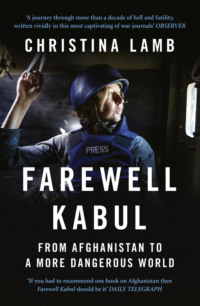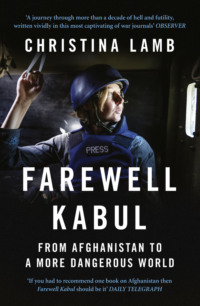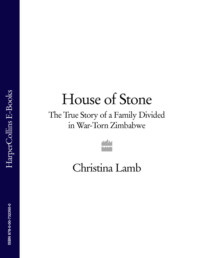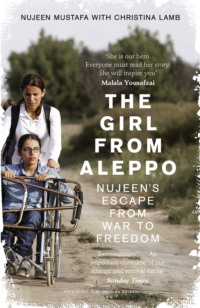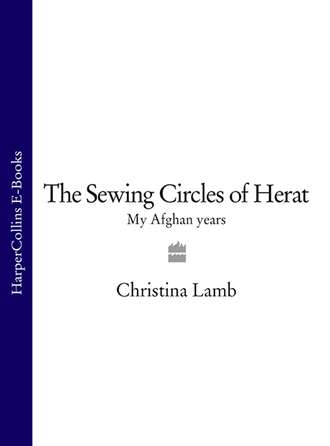
Полная версия
The Sewing Circles of Herat: My Afghan Years
This was probably not an exaggeration. The details took a long while to come out in the world, only when the first refugees started to arrive in Pakistan, but testimony collected by human rights organizations suggests that between four thousand and six thousand people were massacred in Bamiyan after its surrender that August of 1998.
Another woman called Peri Gul with eyes like black olive pits tugged at my arm. ‘There were 300 killed in my village,’ she said. ‘They locked my husband in our house and set fire to it and beat me when I tried to run inside. Afterwards I had to beg bread for my three sons and daughters. Every house was burnt and they sprayed the fields with chemicals and set fire to them so no one had food. Mostly we just scraped moss from rocks. I even thought about selling one of my children but who would buy? Nobody had anything.’ I guessed she was in her mid-20s, ten years younger than me, but she looked old enough to be my mother. Clutching my hand with her calloused dirt-encrusted fingers, she sobbed, ‘We were innocent people just trying to survive. First they starved us then they murdered us. Why didn’t anyone do anything?’
Such stories were so inhuman sometimes I would just want to snap shut my notebook and run away. There were more than three million Afghan refugees in Pakistan and it wasn’t as if it was just the occasional individual with a sad story, it was everyone. I felt like a parasite, sucking up all these tales of tragedy to regurgitate in newsprint for people thousands of miles away, and with no tangible advantage for those I interviewed. I had no answer to why the world had done nothing.
Back in the 1980s when I had lived in Pakistan before, I had interviewed lots of refugees, sometimes spending the night in the camps. But then the Afghans had only suffered eleven years of war, their men were defeating the Russians, and there was still hope in their eyes. Now they had been through twenty-three years of war; their men were killing each other and their eyes were blank. As I watched these Hazara mothers unable to feed their babies, I thought of my own well-fed son back home, dressed in a different outfit every day, a wooden train set taking over the living room, parties with cake and balloons, holidays in the sun. I couldn’t imagine looking into those trusting blue eyes knowing I had no food for him and no place for him to sleep. At a store nearby, I bought them a sack of rice, some bread and apples and some blankets, and their gratitude only increased my guilt. It was not enough, it never would be.
In the orchard that evening, we took a break to go and help ourselves to the barbecue, steaming slices of saji, leg of lamb rotating on an enormous skewer, and for a while we talked of other things. I showed them the photograph I carry of my husband who has the dark eyes and olive skin of the Moors who once ruled Portugal. ‘He looks like an Afghan,’ said Khalil approvingly.
By the time the inevitable pot of green tea arrived, there was a bitter chill and the orchard had emptied of diners. But Khalil had more to tell. Between postings for the secret police, he had spent some months as a bodyguard for Mullah Omar, the spiritual leader of the Taliban. He came from the same branch of the Ghilzai tribe and so was trusted.
Holding my teacup in both hands to keep them warm, I asked him to describe Mullah Omar. One of the most enigmatic things about the Taliban was the reclusiveness of their one-eyed leader. Not only had he never travelled outside Afghanistan, Mullah Omar had barely visited his own country. He had only twice gone to Kabul, preferring to rule from his adopted home of Kandahar though he was actually born in Tarin Kot in Uruzgan, the mountainous province north of the city. He had never given interviews to western journalists, and he had refused to meet with western diplomats.
No pictures of him hung in government offices. Newspaper articles about him were always illustrated by the same blurred photograph taken from television footage of him in Kandahar holding up the Sacred Cloak of Prophet Mohammed at a special gathering of Taliban in 1996. At this ceremony, he had himself declared as Amir ul Momineen, Commander of all Islam; it was also the first time the cloak had been taken out for more than sixty years.
All that was known about Mullah Omar was that until 1994 he had been a simple village mullah in Sanghisar, a small community of mud-walled houses an hour’s drive north of Kandahar. He was about forty, bearded, wore a black turban and had only one eye, having lost the other in a Soviet rocket attack during the jihad in the 1980s, supposedly clawing it out of the socket when he realised that he had been blinded. Even the one eye was sometimes disputed. A few days earlier a friend of a friend had come to my hotel, whispering because of all the ISI officers in the lobby, that he had a picture of the real Mullah Omar. I opened the envelope to see a small black and white passport photograph of a man with a turban and two eyes.
Khalil was not very enlightening on his appearance. ‘He looks normal, medium height, a bit fat and has an artificial eye which is green.’ He had more to say on his personality. According to Khalil, Mullah Omar modelled himself on Caliph Umar, a seventh-century leader of Islam who had been declared Amir ul Momineen of the peoples of Arabia and was the second Caliph after the death of the Prophet Mohammed. A simple man who owned just one shirt and one mantle, and who ordered his own son killed for immorality, Caliph Umar used to disguise himself in ragged clothes to mingle incognito amongst the common people. In the same way, Mullah Omar would go out of his compound at night on his battered old motorcycle to find out what his people were saying about him in the bazaars and chai-khanas or tea-houses.
Khalil said that Mullah Omar presented himself as a man of simple tastes but though he berated his cook every day for serving meat when his soldiers in the field had none, he ate it anyway, and he liked listening to war-chants and riding his Arabian horse around his compound. In fact Khalil had quickly come to the conclusion that the great enigmatic mastermind behind the Taliban was just simple-minded. ‘Mullah Omar knows only how to write Omar and to sign his name,’ he said. ‘He’s completely illiterate.’
I had been told the same thing a few days earlier by General Ishaq, administrator of the hospital in Kandahar that used to treat Mullah Omar, and a former general in the Afghan army. ‘His doctor told me he thought that the rocket had left bits of shrapnel in his brain. He said Omar likes sitting at the wheel of one of his cars making engine noises and that he had days of terrible headaches and mood-swings when he would not see anyone and dreams when he thought he was having visions.’
For Khalil, coming into such close contact with the Taliban leadership was what made him lose faith in the whole movement. ‘It is the first time in Afghanistan’s history that the lower classes of the country are governing and by force. There are no educated people in this administration – like Mullah Omar they are all totally backward and illiterate. They have no idea of the history of the country and they call themselves mullahs but have no idea of Islam. Nowhere does it say men must have beards or women cannot be educated, in fact on the contrary the Koran says people must seek education.’
For all the Taliban leader’s avowed simplicity and proclaimed intention of returning Afghanistan to the time of the Prophet, 1400 years earlier, Khalil said Mullah Omar loved the trappings of power. Not poor himself, he had however been shocked by the lavishness of Mullah Omar’s house, set in a vast walled compound with a mosque, guesthouse, its own farm, stables and houses for the uncle who acted as a father-figure and all his relatives. Built in 1997, all paid for by Osama bin Laden, it had specially reinforced walls and roofs, six feet thick and cushioned with car tyres, to withstand even a cruise missile. He had even had a road moved because it went too close to the compound.
The main house where Mullah Omar lived with his three wives and five children was in an inner walled area. In front of the wrought-iron entrance gate was a fountain flowing over a fibreglass sculpture of a fallen log dotted with small Miami Beach-style plastic palm trees. The house itself was a two-storey building, set either side of a central courtyard which contained a water purification system and was painted with murals of the scenic attractions of Afghanistan including the fort at Kalat, the minaret at Jam, the mosque of Herat and oddly one of the swimming pool at the Intercontinental Hotel in Kabul, but not of course of the Bamiyan Buddhas. Whichever wife was in favour would sleep on the same side of the house as Mullah Omar while the other two would sleep in the other section with the children.
Just outside the inner compound was the guesthouse, a bungalow with a large patio with columns painted like tree trunks and walls decorated with gaudy flower murals. Mullah Omar spent the mornings there, sitting on a bed with a tin of money and a walkie-talkie by his side, receiving his commanders, handing out cash and issuing instructions, usually sent out on paper chits.
Khalil said he sometimes saw Osama bin Laden at Mullah Omar’s house, arriving in a black Land Cruiser with tinted windows, usually in a convoy of seven or eight cars at a time. ‘His bodyguards were all very tall people, Sudanese I think, with curly hair and all with wireless sets and earpieces like those American bodyguards. Sometimes I went to Mullah Omar’s house in Uruzgan when they went hunting for birds or deer together or fishing with dynamite.’
The more he saw of them together the more he became convinced that the Taliban were not really in control. ‘We laughed when we heard the Americans asking Mullah Omar to hand over Osama bin Laden,’ he said. ‘The Americans are crazy. Afghanistan is not a state sponsoring terrorism but a terrorist-sponsored state. It is only Osama bin Laden that can hand over Mullah Omar not vice versa.’
During his time in the Taliban, Khalil had attended two Arab-run training camps, one in Jari Dasht, the Yellow Desert, four hours from Helmand, an area with its own airstrip where Arab sheikhs used to go hunting, and one near Herat. ‘We were taught by Pakistani military trainers how to shoot exact targets and how to move along the ground in the front-line,’ he said. They were also told that if they died while fighting under the white flag of the Taliban, they along with seventy-two members of their families would go to paradise. They were also given blank marriage certificates signed by a mullah and encouraged to ‘take wives’ during battle, basically a licence to rape.
Being ordered to the front-line was to provide Khalil’s chance for escape: ‘We were sixty-two friends sent to Bagram, north of Kabul, and our line was attacked by the Northern Alliance and they almost defeated us. Many of my friends were killed and we didn’t know who was fighting whom, there was killing from behind and in front. Our commanders fled in cars leaving us behind so we also escaped, walking all night.
‘I was very afraid of being caught. I got away but then I was stopped by a line of Arabs who demanded to know why we were escaping. For two days we were under their arrest then taken back to the front-line.’
One night he was put on watch and saw a truck of sheep and goats coming through the lines from Northern Alliance territory so he jumped in and got to Kabul and from there back to Kandahar. There he was arrested and put in jail for eight days and interrogated but managed to get out to Quetta through the intervention of some relatives who were high-ranking Taliban members.
Since leaving the Taliban, Khalil had been living back in Quetta with his wife and baby daughter, and was looking for work. Although he insisted that the Taliban had become an organization ‘in name only’, he feared for his life and I wondered why he had taken the enormous risk of speaking to me. ‘I want people to understand,’ he said, shaking his head. ‘I have done terrible things and the only way I can make up for it is to tell the world the truth about these people.’
Kabul, September 24 2001
Respected Mr Jamil Karzai
Salam alay kum
I hope you and the rest of your family will be alright. I received your letter and I informed other female members of ours, Farishta, Najeba, Sadaf and Maryam about your request to write to a lady journalist who writes for the Sunday Telegraph of Britain.
Respected Karzai, we here really appreciate what you do for the new generation of Afghanistan and we are really worried about your life too. Please be careful.
Here is the letter for Miss Christina Lamb.
Dear Christina
Jamil Karzai has written about you that you are a nice kind beautiful and helpful lady and has asked us, specially me to write a letter about our life under the Taliban regime and I hope this will help you outside understand the feelings of an educated Afghan female who must now live under a burqa.
My name is Fatema, this is my real name but please I ask you to use this name of mine Marri, as what we are doing is dangerous. I’m thirty years old and live in a three-roomed flat with my family on a big estate, it’s called Microrayon. I was born here in Kabul and I graduated from the twelfth class of Hishai Durrani High School, our biggest girls’ school. I speak Dari, Pashto and English. I think you are surprised I know English but my father was a diplomat and my mother an English teacher. My mother went to university in India. So don’t worry.
I know from our friend that you have a kind husband and a beautiful son and you travel the world reporting and meeting people. I dream of a life like that. It’s funny we live under the same small sky yet it seems we live 500 years apart.
You see us now in our burqas like strange insects in the dust, our heads down, but it wasn’t always this way. I do not remember much before the Russian invasion as I was only eight when they came and I felt bad then when I saw the soldiers with their white faces and hair because my parents said they had made slaves of us but even at that time we still went to school. Women worked as professors and doctors and in government. We went for picnics and parties, wore jeans and short skirts and I thought I would go to university like my mother and work for my living.
I know in the villages many schools had been destroyed in the war but here in Kabul we were lucky. Only when the Taliban came were all the girls’ schools and university closed. When the mujaheddin came to Kabul my school was closed for a year because of all the fighting which was very bad particularly here in Microrayon and we were the first line of battle, but then I finished school and became a teacher. I particularly liked science and wanted to go to university to study science but there was no money because my father had lost his job.
When the Taliban came to Kabul, it was September 1996, they told us all to stay at home. They announced it on the radio just like they announced we all had to wear burqas. I had never worn one before, they were something from the village, and it was like not being able to breathe or see, just seeing in front through that small square like a cage, and in the summer it is so hot and the sun blinds you. I fell over twice the first day.
In our house behind all the burqas and shalwar kamiz is a red silk party dress, my mother’s from the time when the king was in power and my father in the foreign ministry. Sometimes I hold it up against me and imagine dancing but it is a lost world. Now we must wear clothes that make us invisible and cannot even wear heels. One of my friends was beaten with cable for wearing white shoes because the Taliban said, ‘how dare you wear the colour of our flag’, and another because they said they could hear her shoes click on the pavement.
You might think we women are doing nothing but my friends and I struggle for the rights of Afghan women working secretly here for the Afghan Women’s League, trying to educate our women and young girls. Some of our members make nan bread and distribute it to widows, there are so many widows from this long war, you see them in all streets in the city begging in their torn clothes but the Taliban beat them and say they are not allowed out without mahram, that’s what we call men relatives like a husband or father.
My sister and I hold secret English and science classes in our house. It is hard as all the time we fear someone might report us and we cannot get books. Our students pay a little and we use it for firewood to keep warm. We do not even have a blackboard. We tell them do not bring bags and sometimes we stop for weeks because we have heard the Taliban are onto us. We thought about contacting an NGO but we are worried the Taliban would find out. Some other schools have been found and the teachers beaten.
We have small rebellions. Maybe you do not know we are forbidden to wear make-up under the burqa but I have a red lipstick. One of my friends runs a secret beauty salon in her bedroom.
In my family I am the eldest and apart from my sister Latifa, I have two brothers. One is a tailor, the other still a student but in school now all he learns is the Koran and the Hadith, not science or foreign languages. Science was my favourite subject. I wanted to be a science teacher.
Life here is very miserable. We have no rights at all and we have asked many times other countries of the world for help but they have been silent. Now we heard about this attack on the towers in America with many people dead and my father says the Americans will come and remove the Taliban but we do not dare hope. I wonder, maybe the world will think all Afghans are terrorists and we are not. It is the Arabs, who drive around in their Datsuns with black windows and live in big houses behind high walls in Wazir Akbar Khan and buy their foods in tins in the import shops in Chicken Street. If you saw how we lived, you would know we cannot be terrorists, we are the forgotten people.
We do not have schools, the doors of education are closed on all, especially us. I don’t know if we will ever go to school again. We cannot paint or listen to music. The Taliban ran their tanks over all the televisions.
We asked the world, are we not human beings? Do we not deserve to live in peace? Can we not have rights as women in other countries?
I do not know what you want me to write to you. If I start writing I will fill all the paper and my eyes will fill with tears because in these seven years of Taliban no one has asked us to write about our lives. In my mind I make a picture of you and your family. I wonder if you drive a car, if you go out with friends to the cinema and restaurants and dance at parties. Do you play loud music and swim in lakes? One day I would like to see and I would also like to show you a beautiful place in my country with mountains and streams but not now while we must be hidden. Maybe our worlds will always be too far apart.
Marri
1 According to the US State Department, Afghanistan’s opium crop in 2000 was 3,656 tonnes, 72 percent of the world’s total, compared to 31 percent in 1985. Production fell in 2001 after the Taliban banned the growing of opium poppies, but in 2002, following the fall of the Taliban, Afghanistan became the world’s biggest opium producer again.
2 The combination of US and Soviet aid probably made Afghanistan the world’s largest recipient of personal weapons during the 1980s, according to figures from the 1991 SIPRI Yearbook on World Armaments, with total weapon imports greater than those of Iraq. For more details see Barnett Rubin.
3 Population figures in Afghanistan can only be estimates and are all hotly disputed by the various ethnic groupings. The CIA World Fact Book 2001 puts the population at 26.8 million of which 38 percent are Pashtun, 25 percent Tajik, 19 percent Hazara, 6 percent Uzbek and 12 percent other.
4 For more details see the Human Rights Watch report of November 1998 – ‘Afghanistan: The Massacre in Mazar-i-Sharif’.
2 Mullahs on Motorbikes
Unlike other wars, Afghan wars become serious only when they are over
SIR OLAF CAROE
TRAVELLING IN AFGHANISTAN was like wandering through the shadows of shattered things. Khalil Hassani’s story had meant more to me than he realised for Afghanistan had left its own dark place in my mind. When he spoke of Kandahar, I pictured a land the colour of dust, its old caravan trails littered with burnt-out tanks and dotted with bombed terracotta villages which from a distance resembled the ruins of some forgotten civilisation and probably looked little different to when Alexander the Great founded the city in 330 BC giving it his name, Iskandar in Arabic. But I saw something else too.
The first time I went to Kandahar I was on the back of a mullah’s motorbike and thought it the most desolate place on earth. Nothing but tufts of coarse grass grew on the stony plains and the distant mountains were barren and flesh-coloured. The turban wound round my head offered scant protection from the ancient grit driven into my eyes and mouth on a scorching desert wind that was said by Kandaharis to be so hot as to grill a fish held on an upturned palm.
It was 1988 and the giggling mullahs on motorbikes who taught me to tie a turban and shared their rations of fried okra and stale nan bread with me under Soviet tank-fire, would later become the Taliban. No one had heard of the Taliban then, it was just a word in Pashto that meant ‘seekers of knowledge’ or religious students. And not many journalists went to Kandahar in those days. The journey to Afghanistan’s second biggest city was complicated and dangerous, starting off from the remote desert town of Quetta where the earth seemed in a constant state of tremor and to which flights were sporadic.
Most reporters covered the war from Peshawar where there was a five-star hotel and the seven mujaheddin parties fighting the Russians had their headquarters, making it easy to arrange trips ‘inside’, as we called getting into Afghanistan. There was an American Club where one could drink Budweisers, eat Oreo Cookie ice-cream and listen to middle-aged male correspondents in US Army jackets with bloodstains and charred bullet holes on the back hold court with stories of conflict and ‘skirt’ from Vietnam to El Salvador. Their eyes had seen so much that they saw nothing, they knew the name and sound of every weapon ever invented, their faces were on the leathery side of rugged and even at breakfast there was Jim Beam on their breath. One of them wore hearing aids which he informed me loudly was because of ‘bang bang’; most had children in various places but never carried their photographs, and all of them went to the Philippines for R and R.

The Kandahar desert had been turned into a battlefield.
It was different for me. I was a young girl in a place where women were regarded as property along with gold and land – the three zs of the Pashtuns, zan, zar and zamin – and kept hidden away behind curtained doorways. The closest I had ever come to war was doing a report for Central Television News in Birmingham on a cannon used in the Battle of Waterloo that ‘Local Man’ had rescued from the sea. I found the weapon names confusing with all the acronyms and numbers and for a long time couldn’t even tell the difference between incoming and outgoing fire. I was young enough to believe I could change the world by writing about the injustices that I saw and foolish enough to think that I could be a witness without bearing any responsibility. What I knew of the Afghans was a romanticised vision distilled from Rudyard Kipling’s Kim and various nineteenth-century British accounts such as the first by Mountstuart Elphinstone who went out to parley with the king on behalf of the East India Company in 1809 and wrote, ‘their vices are revenge, envy, avarice, rapacity and obstinacy; on the other hand, they are fond of liberty, faithful to their friends, kind to their dependents, hospitable, brave, hardy, laborious and prudent.’



